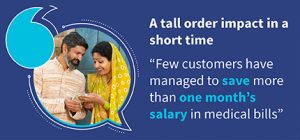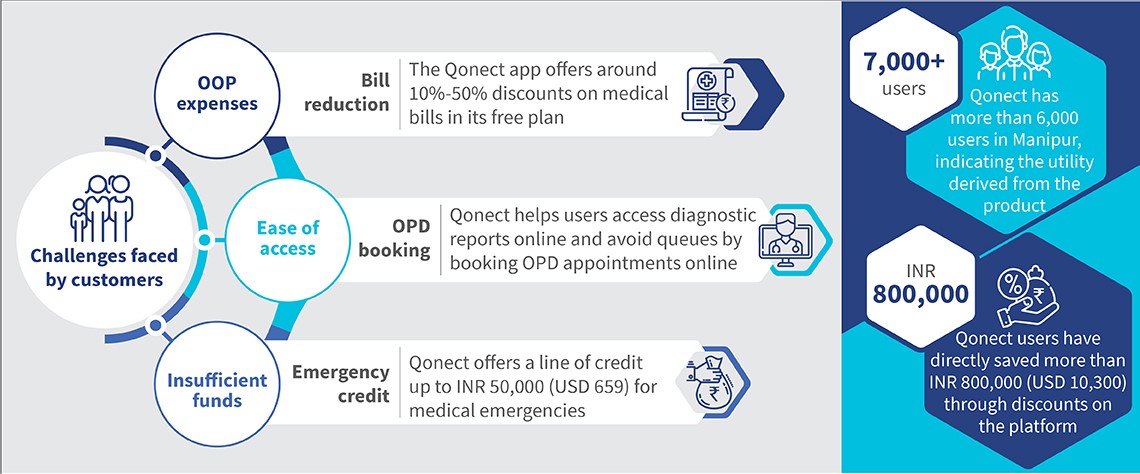What does HealthTech have to do with financial health? Let us Qonect the dots!
by Devraj Hom Roy
Jun 1, 2022
6 min
Many LMI households in India lack timely access to good quality medical care. Further, steep healthcare bills are deterrents to timely treatment, and out-of-pocket medical expenses have pushed more than 55 million Indians into poverty. Qonect, a HealthTech platform, helps patients connect with medical service providers and provides credit for medical expenses.
“If I could save 10% of my father’s medical bills, I would not need to ask anyone for money,” Lian Thangvung thought as his phone chimed with an INR 10,000 (USD 132) transfer notification from his sister. A year later, the budding entrepreneur did what few can do—act on his conviction, so others do not suffer. Lian founded Qonect, a HealthTech platform, in Manipur.
Qonect is a subscription-based digital health platform that offers various online medical services, such as discount medical orders and online booking of appointments, and diagnostic services, such as access to labs, archiving, and digital access to diagnostic reports. Personal experiences, an entrepreneurial mindset to solve complex problems, a supportive family, and ambition shaped Lian and fueled Qonect to its current stage.
Born out of empathy and personal experience—the phone call in 2017:
A phone call in 2017 kickstarted Lian’s journey when he heard about his father’s ailment. He immediately rushed to his home state of Manipur from New Delhi. What followed was emotional and formative for Lian and shaped his uncanny mix of grit and empathy. The doctor recommended a CT scan for his father during the diagnosis.
CT scan facilities are difficult to find in Manipur. On locating a facility, Lian found that a CT scan can cost anywhere between INR 8,000 (USD 105) to INR 10,000 (USD 132) in India. Lian did not have enough money to support his father’s diagnosis and treatment. Nor did he have the time to go through the protracted process of taking a bank loan, which had a fair chance of being rejected. His sister’s timely intervention helped Lian manage the crisis at that time.
Lian did not want others to suffer in similar circumstances and started to build solutions for these issues. Out of his efforts, Qonect was born in Manipur in June 2018.
The malaise runs deep—out of pocket expenses have pushed more than 55 million Indians into poverty:
Typical of a developing country, India’s population is also underinsured, leaving large sections vulnerable. Before the pandemic, roughly 8 out of 10 Indians met medical expenses out of pocket (OOP). In rural India, such OOP expenses averaged around INR 816 (USD 11), constituting roughly 12% of non-food expenses. Such high OOP expenses on medical care pushed 55 million Indians into poverty, even before the pandemic.
The COVID-19 pandemic was a double whammy. The cost of ICU hospitalization during COVID-19 was almost equal to nearly 16 months of work for a daily wage laborer or 10 months of work for a salaried or self-employed worker. Various estimates show that the pandemic drove another 32 million middle-class Indians into poverty. At a time, when loss of income rendered most LMI households vulnerable, out-of-pocket medical expenses and the high cost of healthcare were the top two reasons that plunged people into poverty. Such debilitating costs instill fear in patients, and as a result, they avoid medical care altogether, fearing that diagnosis of any acute diseases can break the household’s finances.
Qonnecting the dots—a bridge between healthcare providers and negligent at-risk patients:
Qonect has taken the bull by its horns by solving the problem of rising healthcare costs, starting with one of the most vulnerable and excluded regions of India—the Northeast. Qonect began as a health card in Manipur that offered discounts on medicine purchases, thereby reducing the OOP expenses. But soon, the pandemic hit, and the physical engagement with clients came to a halt.
Lian and his team at Qonect lost no time adapting to the pandemic’s new norms. They went digital to its current avatar—a digital subscription platform. Qonect partners with medicine retailers and negotiates preferential rates for medicines which are passed on to the users as discounts. The subscription amount helps to maintain the technology, as well as in pay the premiums for the insurance offered to the users as part of the plan. Their next objective was to provide fast and affordable financing to users for medical emergencies. Qonect partnered with a lender to offer instant credit for such emergencies. The credit is currently offered through partnership with an NBFC and is based on the credit history and bank account balance of the users. Gradually, Lian and his team have managed to give shape to their vision through the Qonect app.
Lian remains focused on the purpose of Qonect as he says, “Qonect should be the bridge between healthcare providers and people who delay or avoid medical care because of costs.” Qonect has already impacted the lives of vulnerable low-income people in Manipur. Qonect has established the relationship between HealthTech and financial health.
Patients who make OPD bookings through the app save money that would otherwise result in significant OOP expenses, given the hilly and often inaccessible terrain of Northeast India. Furthermore, test results and doctors’ prescriptions can be delivered over the platform, thus saving patients from having to travel to collect these from the OPD. While the subscription model currently offers substantial discounts on medical costs, Qonect plans to offer a completely cashless experience to its customers and provide buy-now-pay-later (BNPL) credit for any medical expense. Such a BNPL product feature will underwrite customers on the basis of their transactions done on the Qonect platform as well as other alternate data points. Such an all-inclusive subscription will fortify the financial and physical health of the households as customers inculcate sustainable and repeatable behavior that reduces negligence and encourages timely attention.
Figure 1: Translating product design to impact
One of the proudest feats for Lian so far has been helping customers save more than a month’s salary equivalent in 
No shortcuts to success
But, building products based out of Manipur in the Northeast is hardly a walk in the park. Geographical constraints, such as lack of access to infrastructure and resources along with widespread information asymmetry among customers, are daunting barriers for any startup. For example, Imphal, where Lian wants to set up offices, lacks good internet connectivity and suffers from power outages. “Sometimes, I am forced to miss calls with investors or partners because of internet outages or running out of backup during prolonged blackouts,” says Lian. However, Lian and his team have found strategies to overcome each such challenge with their grit.
The government has provided satellite internet at the village panchayat, and Lian, with his elder brother and the village chief, uses this connectivity during consumer internet outages. Such efforts, combined with the network and handholding from CIIE.CO and MSC have helped Qonect beat the odds.
However, an obvious question remains—why go through such difficult paths when Lian can move his offices to Guwahati, the biggest city in Northeast India? Lian’s headstrong conviction reflects in his answer, “I want the young ones from these regions to believe that it does not matter where you come from as long as you have zeal and passion.” No surprise then that Qonect now attracts investors from the metros across India, who frequently fly to Imphal to keep close tabs on Qonect’s operations.
What next?
Qonect’s vision is clear. It wants to be the first startup from Northeast India to expand and provide healthcare services across India. For the immediate next steps, MSC is supporting Qonect in understanding the needs of a diverse set of customers through market segmentation. MSC is also helping Qonect to achieve a product-market fit for LMI customers across various states of India by packaging credit and healthcare in an intuitive subscription model.
In the mid to long term, Qonect wants to develop predictive capabilities to mitigate risks for medical emergencies from preventive and financing perspectives. Apart from delivering impact at scale, Qonect has set ambitious but achievable business goals. The goal is to hit a revenue of INR 300 million (USD 4 million) in the next 18 months.
With Qonect’s empathetic product design and rapid growth to date, no mountain is too high. The future is not far away when a family a medical emergency will be able to afford the best medical attention for their loved ones without the additional concerns of access and funds.
This blog post is part of a series covering promising FinTechs making a difference in underserved communities. These startups receive support from the Financial Inclusion Lab accelerator program. The Lab is a part of CIIE.CO’s Bharat Inclusion Initiative, co-powered by MSC. #TechForAll #BuildingForBharat
 by
by  Jun 1, 2022
Jun 1, 2022 6 min
6 min 

Leave comments